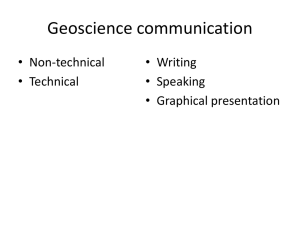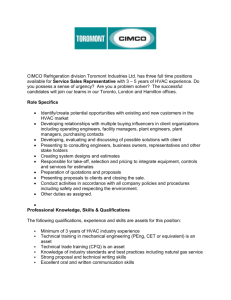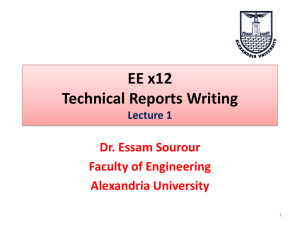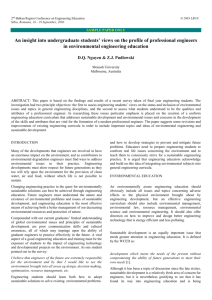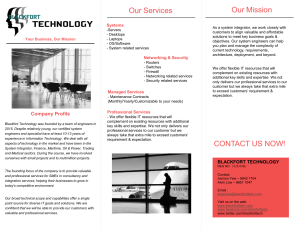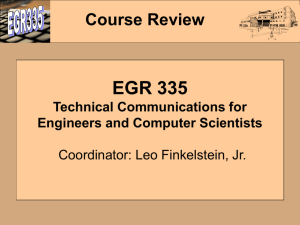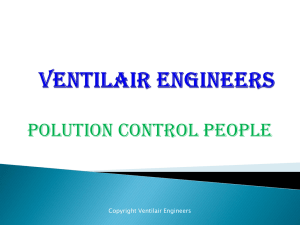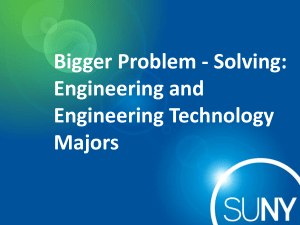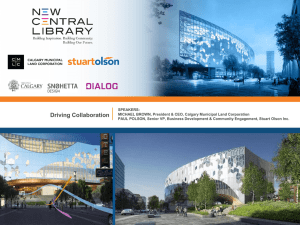Transforming Engineering Education
advertisement
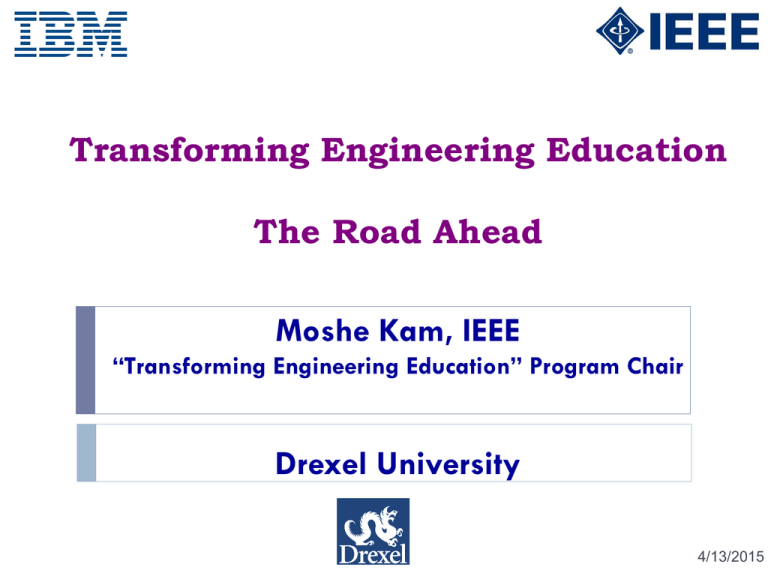
Transforming Engineering Education The Road Ahead Moshe Kam, IEEE “Transforming Engineering Education” Program Chair Drexel University 4/13/2015 Outline Why do we need to transform engineering education? Broad themes discussed in the conference The 2 Road Ahead What are we going to do after this conference? 4/13/2015 Why do we need to transform engineering education? 3 Decline in interest in engineering as a career path among young people in several major industrial countries The sense that entry level engineers lack necessary skills The sense that the business environment has changed but engineering education did not keep pace 4/13/2015 Broad Themes Increasingly, engineers face challenges that involve large scale, complex systems Current curricula rarely address such challenges 4 …requiring strong interaction with non-engineer experts and the public … (overly) focused on preparation in mathematics and physics and on engineering science Making engineering education crossdisciplinary is a hard but worthy challenge 4/13/2015 Desired Skills of Graduating Engineers Able to communicate effectively to technical and nontechnical audiences Able to self educate Able to work in heterogeneous teams (including virtual teams) 5 ‘Process’ large volumes of information – sift through and generate knowledge Understand that education of engineers continues for a lifetime And to converse with professionals in Law and Business Willing to take risks, experiment, and be innovative 4/13/2015 Engagement with the Community Many curricula operate with little regard to the community wherein they reside 6 Engagement of students in their local community can provide a partial solution. Examples: Conduct student design projects in the community Such as Purdue University’s EPICS project Place graduate students as trainee teachers in high schools as part of their training 4/13/2015 Better Communication Skills… Would improve the public discourse on science and engineering Would help communities understand the potential and impact of proposed engineering projects Increase understanding of engineering among young people 7 …and their parents and teachers …with potentially positive impact on choosing engineering as a career path 4/13/2015 Observations on the Curriculum The current engineering curriculum is jampacked We have hard time eliminating existing taught material One possible “solution” is to try to imbed new themes in the existing curriculum Rather than starting new courses “Significant changes may be possible without a major overhaul” 8 4/13/2015 More on the curriculum We lack a common view of what the curriculum is trying to achieve 9 One model: Undergraduate education – broad background for entry level engineering practice M.S. level education – specialization for professional practice Ph.D. level education – preparation for specialized R&D 4/13/2015 Technology and the curriculum Technology changes continue to affect delivery and content of the curriculum: 10 Ability of students to discover and process on-line information Impact of distance learning and online delivery on quality and efficiency of teaching and learning Emergence of scientific computing software as a tool in design Role of software engineering in engineering curricula 4/13/2015 The Road to Reform: the University Reward System If Engineering Education is to change, the university reward system will have to change as well If improvement is to be made ‘continuous,’ we need to be able to measure it 11 At present many schools weigh scholarly publications, graduate student advising and research funding much more than excellence in undergraduate education Identify the metrics Align improvement with the reward system 4/13/2015 Thinking Globally Wide agreement on the need to increase global understanding and engagement Proposed ways to achieve this goal: Semester abroad Participation in Engineers without These recommendations are Borders projects not exactly “global” Study of languages 12 4/13/2015 Engineering Literacy for nontechnical students Sure engineers need to learn how to talk to non-technical audiences… But non-technical audiences need to be exposed to some level of understanding of engineering as well Engineering departments have the obligation to provide engineering literacy courses and labs to non-engineers 13 Political leaders of the future should possess at least a minimal level of engineering literacy 4/13/2015 University-Industry Exchanges Feedback from industry to academia is needed Co-op and industry internships can help Few university professors have practiced in industry. Still… 14 At present it is often indirect and ineffective 14 …while many faculty members spend sabbatical leaves in industry and serve as consultants to industry… it is very rare that established industry practitioners come to the university for extended residence 4/13/2015 The Road Ahead What are we going to do after this conference? 15 4/13/2015 A few conference-related activities Develop and disseminate the Proceedings of the Conference All papers and presentations Provide a summary and a ‘manifesto’ 16 A more formal presentation of the main themes, ideas and proposals discussed at the Conference 4/13/2015 Implementation of proposals and action items We need to make a concrete list of ‘desired but missing’ skills To encourage development of ‘desired but missing’ skills we will develop a set of recommendations and resources 17 First iteration: find out what training industry is already paying for and label it “important for industry” Identify what is appropriate for the curriculum For schools For regulatory bodies and accreditation agencies 4/13/2015 How would the recommendations Principal dissemination be expressed? As “best tool – a web portal on ideas for a better engineering curriculum practices” As repositories of case studies As proposals for stand-alone courses Along with detailed curricular materials and on-line resources As proposals to imbed skill training in existing curricula 18 With examples and training materials 4/13/2015 More concretely… IEEE will provide IBM with a proposal for joint development of the curricular resources (within 45 days) We will use an existing resource to get the project underway 19 A proposed joint IEEE/IBM project Open invitation to other professional associations and corporations to join Real World Engineering Projects or TryEngineering Aim at first launch by the second quarter of 2011 4/13/2015 Questions and Comments 20 4/13/2015

